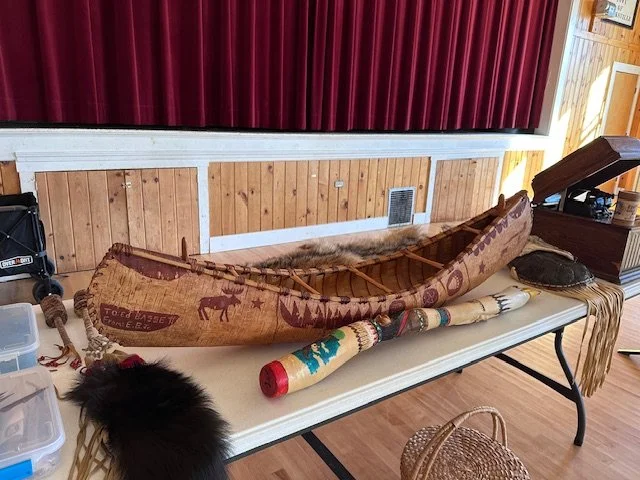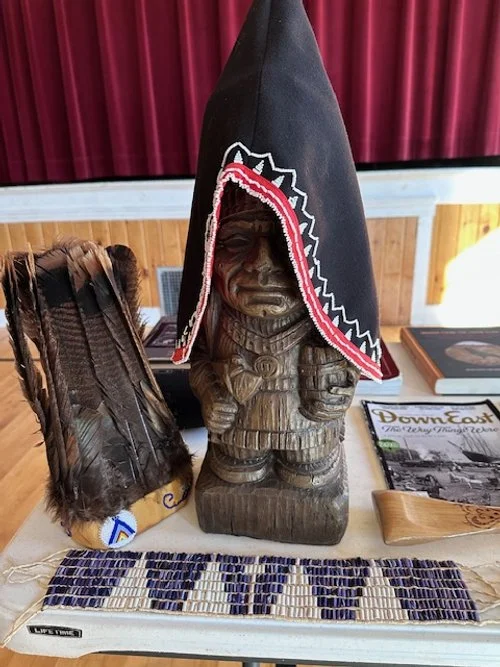Passamaquoddy man transcribes recordings of voices from the past
‘If you want to speak a language and want to help revitalize a language, join us,’ says Dwayne Tomah
Dwayne Tomah holds a male headpiece from the Passamaquoddy tribe. Photo by Jessica Hardy.
By Jessica Hardy
BROOKSVILLE– A Passamaquoddy man who has been transcribing the voices from wax cylinders of his tribe spoke about the importance of maintaining a language that was “systematically taken, not lost” from his people at a gathering in Brooksville on Nov. 7.
Dwayne Tomah, the youngest, fluent speaker of his tribe’s language, made his presentation as part of the Wabanaki Speaker series hosted by Blue Hill Heritage Trust. The morning presentation, held at the Brooksville Community Center, focused on the importance of language. Tomah had also presented the night before at the Bagaduce Music Library in what he called an “intense” lecture on “power and dominance.”
Tomah plays a drum to mimic a sound everyone knows: a mother’s heartbeat. Photo by Jessica Hardy.
Tomah, a Passamaquoddy language keeper and member of the tribal council, spoke about the importance of language to “us,” emphasizing that “us” means everyone.
“There are things we need to do to work together,” he said.
Tomah was given the assignment to transcribe wax cylinders that recorded tribal ancestors in the late 1800s by anthropologist Jesse Walter Fewkes. The cylinders, which contain Passamaqouddy words, phrases and songs, are now kept in the Library of Congress in Washington, DC.
“My ancestors were pushing me to finish this collection,” Tomah said. Of the 31 cylinders that recorded voices of the past, only seven were inaudible.
During the lecture, Tomah played digital recordings of several cylinders with the voices of his ancestors talking about the natural world. Each cylinder has different topics from friendship to death through song and music.
While the digital recordings played, Tomah rhythmically beat a drum to the sound that he says everyone knows: a mother’s heart beat. The recordings included the same rhythm from more than a century ago
Many of the words recorded on the cylinders have changed and evolved over time. With technology, Tomah has been able to digitize and enhance the words of the past for a clear sound.
But that’s not where the work stopped. After transcribing them, Tomah went to tribal elders to make sure nothing was missing. The elders in the Passamaquoddy tribe are the knowledge keepers and are shown the utmost respect, he said.
The words, both digitally preserved and now transcribed, bring back the connection between the present and past.
“There are good things that are happening, too,” Tomah said, adding that it’s important to work together in order to come together. “It’s okay to be different.”
In addition to the wax cylinders, Tomah brought artifacts and books for the two dozen people in the audience.
Tomah will make another presentation in the coming weeks in Camden, and all are welcome. Lesson plans for teachers, stories of the Passamaquoddy, dictionaries and more books will become available in the future to share, he said.
“If you want to speak a language and want to help revitalize a language, join us.” Tomah said. “We welcome them.”
The Passamaquoddy Museum is located in Indian Township along the Canadian border and welcomes all.
Tomah brought along several artifacts, including a model canoe, a Passamaquoddy statue with a woman's head piece, a quahog necklace and a feathered male head piece. Photos by Jessica Hardy.





